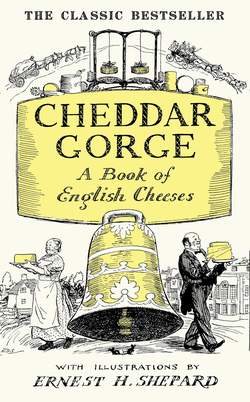Читать книгу Cheddar Gorge: A Book of English Cheeses - John Squire - Страница 9
ОглавлениеIII
Interlude by the Artist
By Ernest H. Shepard
Having climbed the hill at Randwich, I expected to see a pleasant old-world village – a suitable setting for the once famous cheese fair – but all I found was a straggling line of cottages, a small Inn and a half-developed garage. It was a grand situation on the top side of the hill and could boast a fine view, with Stroud lying below in the valley. A hot, sleepy Sunday morning had sent people indoors, but I found an old man nailing up his trellis by the front door and asked him if he could help me. ‘There baint no cheese fair round ’ere. Maybe there used to be, but I ain’t ne’er ’eard tell o’ ’un. They doant make no cheese, eyther. You’m ’ave to go Chipping Sodbury way for that,’ he added. So I turned my back on Randwich and set off, down the steep narrow road into Stroud and up the far side, heading south-westwards, towards the Bath road. It was noon when I reached Chipping Sodbury and dawdled up the wide, sunny street. Coming to the top, where the little town ends, I stopped beside the ‘Grapes’ and watched the potman leisurely open the door – to show that the hour had arrived when a traveller could lawfully assuage his thirst.
The bar was empty and I went in and sat down but soon customers began to drift in and I listened to the broad Gloucestershire voices talking of the week’s happenings. Presently the conversation turned to the coming ‘Mop’ fair.
So I joined in and asked if a cheese fair was ever held in the town. After the silence that always greets a stranger, my question was answered by a chorus of ‘No’. ‘But I thought Chipping Sodbury was famous for cheese,’ I queried, rather mendaciously. Again I was wrong but, not to be defeated, I asked, ‘Are there any farms around where they still make cheese?’
‘They used to make sum down’t Mr. Martin’s … That were in th’ old man’s time.’ Then after a pause. ‘They are not made no cheese there since I can remember.’ I waited for more. ‘I reckon you’ll ’ave to go Stinchcombe way. Ask Bob Ruddick,’e’ll know. Ay, ask Bob.’
Bob Ruddick, he knew because he worked as a lad on a farm where they made the cheeses and where, for all he knew, they still made ’em. He were pretty certain they did still make ’em and if it weren’t Davis’ Farm then it might be another, for up in the Berkeley Vale was the cheese-making country and if you went up along the Gloucester Road or along under Stinchcombe, you’d be sure to find ones that still made ’em. Though (mind you) there ain’t many of ’em left now … and so, I finished my pint and made for Berkeley.
The scent was hot there and my spirits rose when the barmaid of the ‘Berkeley Arms’ told me of Mrs. Browning’s, not four miles off – and it was there at Actree’s Farm – a stone’s throw from the Bristol-Gloucester road that I found cheese, and peace.
The farm – brick, snug, set down fairly and spaciously among its out-buildings – was a fitting place and Mrs. Browning (like Elizabeth Barrett) a poetess, only of cheeses.
She took me to the dairy and showed me all the implements of her art. The big iron presses and vats and the round wooden troughs – all so ancient and so English and for which few modern substitutes have been found – and then, in turn, into the great garret under the roof beams where stood all the cheeses – great and small, double and single, baby cheeses and giant cheeses – slowly ripening. All earmarked for special customers – many for London clubs – such is Mrs. Browning’s fame.
Then I was told how carefully the cows have to be watched and herded. Should they stray on to a wrong pasture then the cheese is spoiled. Neither must there be too much richness in the milk. The butter-producing cow cannot give cheese milk, mark you.
And then all the questions of temperatures and cultures. No wonder that the weeks of cheese-making mean constant anxiety and little sleep. So I was taken to the kitchen and shown the red and blue cards, many framed on the walls, of prizes gained and, best of all, I was given a taste of Prime Double Gloucester.
What more could man wish for?
